Foods & Beverages You Should Immediately Eliminate From Your Diet
Research studies have proven (and patients long reported) that the foods below are the worst offenders. Even one small serving a day can trigger a night of sleeplessness and pain. Thus, these are the first foods that MUST be eliminated from your diet. In our experience, the patients who continue to consume these foods, especially that one cup of coffee or soda a day (decaf or regular), are those who suffer the most with pain and discomfort. Furthermore, we believe that no therapy can counteract the damage and irritation created by a daily “acid” wash from these foods. If you want your bladder to calm down, your first step is to eliminate these risk foods.
#1 – Coffee
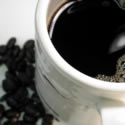 Coffee’s (regular & decaf) are, by far, the most irritating to an IC bladder, not just for the caffeine but also for the very high acid level. We strongly suggest that you avoid all coffees if you are currently symptomatic. When your bladder has calmed down and your symptoms have improved, first try the herbal coffees (Pero or Cafix) and then try a low acid regular coffee (Simpatico, Puroast, Euromild).
Coffee’s (regular & decaf) are, by far, the most irritating to an IC bladder, not just for the caffeine but also for the very high acid level. We strongly suggest that you avoid all coffees if you are currently symptomatic. When your bladder has calmed down and your symptoms have improved, first try the herbal coffees (Pero or Cafix) and then try a low acid regular coffee (Simpatico, Puroast, Euromild).
#2 – Regular & Green Tea
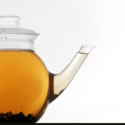 Regular teas (hot and iced) get their flavors from “tannic acid” and thus easily irritate the bladder. Green teas are also notoriously acidic despite the advice of family and friends who say that it helps. It doesn’t. The worst tea of all? Powdered sugar free instant iced teas which are also filled with nutrasweet and other irritating preservatives. If you’re desperate for tea, try a plain herbal chamomile or peppermint teas which are calming and soothing to smooth muscle of the bowel.
Regular teas (hot and iced) get their flavors from “tannic acid” and thus easily irritate the bladder. Green teas are also notoriously acidic despite the advice of family and friends who say that it helps. It doesn’t. The worst tea of all? Powdered sugar free instant iced teas which are also filled with nutrasweet and other irritating preservatives. If you’re desperate for tea, try a plain herbal chamomile or peppermint teas which are calming and soothing to smooth muscle of the bowel.
#3 – Soda, Diet Soda, Energy Drinks & Vitamin Waters
 Think about it? If a soda can remove rust from a penny, just imagine what it would do to a wound in your bladder. Sodas are highly irritating not only for the citric acid used for flavoring, but also for the preservatives and flavorings. Diet sodas are even worse due to the presence of artificial sweeteners like aspartame. Throw in caffeine, green tea and/or multivitamins found in energy drinks and vitamin waters and it’s a guaranteed bladder trigger.
Think about it? If a soda can remove rust from a penny, just imagine what it would do to a wound in your bladder. Sodas are highly irritating not only for the citric acid used for flavoring, but also for the preservatives and flavorings. Diet sodas are even worse due to the presence of artificial sweeteners like aspartame. Throw in caffeine, green tea and/or multivitamins found in energy drinks and vitamin waters and it’s a guaranteed bladder trigger.
#4 – Fruit Juices
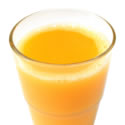 Fruit juices, particularly cranberry, orange, lemon and tomato juices, are very acidic because each glass carries the acid of not just one piece of fruit, but many that have been squeezed to make that juice. Juices are notorious for triggering an IC flare. We suggest that you try pear or apple juice, preferably a “baby” version. Why?? Baby juices use less acid and are easier for an IC bladder to tolerate. It’s also helpful to dilute juices with water and/or ice.
Fruit juices, particularly cranberry, orange, lemon and tomato juices, are very acidic because each glass carries the acid of not just one piece of fruit, but many that have been squeezed to make that juice. Juices are notorious for triggering an IC flare. We suggest that you try pear or apple juice, preferably a “baby” version. Why?? Baby juices use less acid and are easier for an IC bladder to tolerate. It’s also helpful to dilute juices with water and/or ice.
#5 – Beer, Wine & Spirits
When alcohol is poured on a wound, it hurts. Right? Right! Thus, it comes as no surprise that drinking alcoholic beverages can trigger discomfort in patients. In fact, 95% of patients participating in an ICN survey reported that their symptoms worsened when drinking alcohol. However, there is some varation in that. Pale lagers or ales were better tolerated than dark ales. Low acid wines better than high acid. Lighter colored spirits (i.e. sake) did better than darker ones. You can read much more about alcohol and the IC friendly variations in our 2012 Guide to the ICN Diet.
#6 – Artificial Sugars
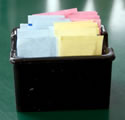 Artificial sugars (Nutrasweet, Aspartame, Sweet N Low, etc.) continue to generate a lot of criticism. In the Summer of 2005, a study was released that found that patients who used artificial sugars, as opposed to regular sugar, had a much higher likelihood of obesity. In the IC bladder, most artificial sugars create profound irritation and discomfort.
Artificial sugars (Nutrasweet, Aspartame, Sweet N Low, etc.) continue to generate a lot of criticism. In the Summer of 2005, a study was released that found that patients who used artificial sugars, as opposed to regular sugar, had a much higher likelihood of obesity. In the IC bladder, most artificial sugars create profound irritation and discomfort.
#7 – Chocolate
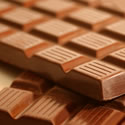 Chocolate is notorious for triggering IBS, allergies and, in an IC bladder, irritation and pain. If you’re desperate for chocolate, try a white chocolate or a very dark, semisweet chocolate. It’s the cheaper milk chocolates that seem to be the most irritating. We’ve also found some amazingly good carob candies that can easily satisfy your sweet tooth, including carob rice crunch bars, carob english toffee, carob honeymoons & more! You can purchase these in the ICN Shop!
Chocolate is notorious for triggering IBS, allergies and, in an IC bladder, irritation and pain. If you’re desperate for chocolate, try a white chocolate or a very dark, semisweet chocolate. It’s the cheaper milk chocolates that seem to be the most irritating. We’ve also found some amazingly good carob candies that can easily satisfy your sweet tooth, including carob rice crunch bars, carob english toffee, carob honeymoons & more! You can purchase these in the ICN Shop!
(Special Note About Gluten)
Some would argue that gluten containing products should be included on this list. Some patients have reported a 90% improvement in their IC symptoms while others have had no improvement. We can’t broadly label gluten as a risk food for IC because many patients tolerate it well. On the other hand, doing a trial elimination of gluten containing products (breads, pastas, carbos, etc. ) is a valid experiment, especially if you have struggled with a variety of unexplained stomach and bowel symptoms. If going gluten free makes you feel better, then power to you!
Author: Jill Osborne. Updated 01/22/16
